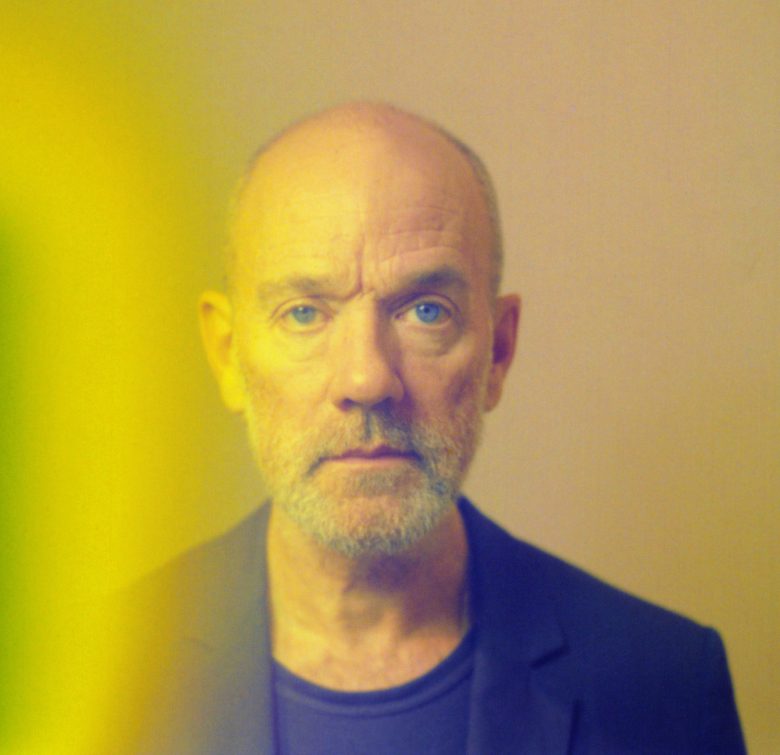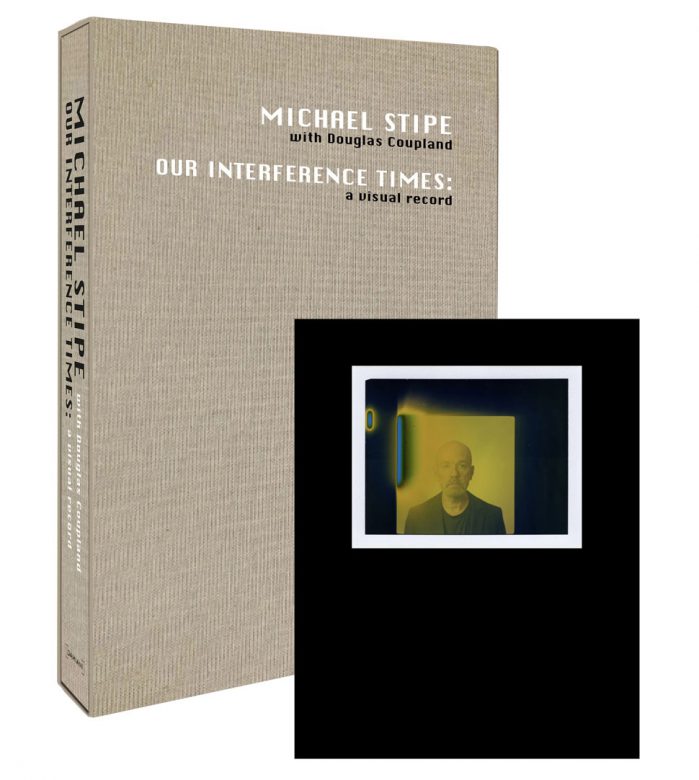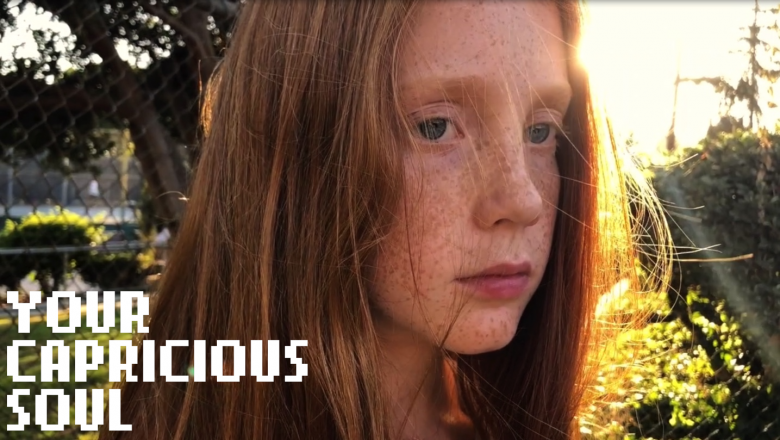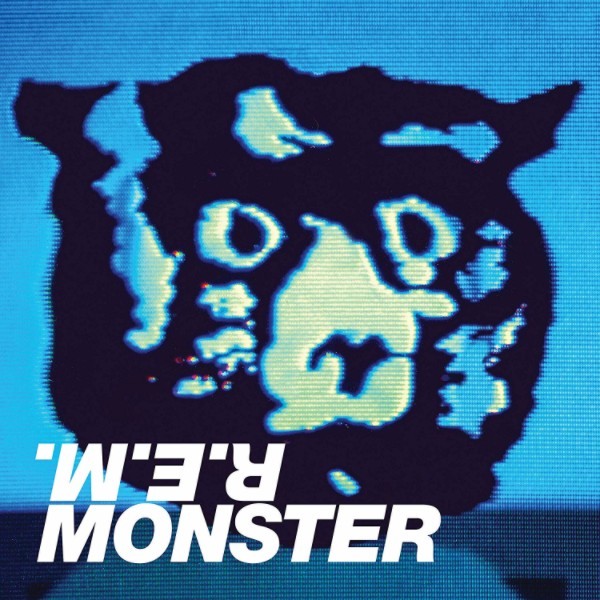Despite his apparent radio silence, Michael Stipe has been anything but idle since the dissolution of his legendary band R.E.M. in 2011, keeping himself busy as a visual artist based in New York City, but last October, he re-emerged in a surprising return to the music world with new solo material.
Without warning, one of the most iconic vocalists and performers of our time presented an entirely personal communiqué via his new single, “Your Capricious Soul,” released in conjunction with and in support of a mass protest held by the UK based non-violent environmentalist group Extinction Rebellion, with all proceeds from the single going to the organization.
In addition to unveiling his solo musical endeavour, Stipe also recently published a second book of visual work, Our Interference Times: A Visual Record, created in collaboration with Canadian artist Douglas Copeland.
And, in a near-comical torrent of activity, Stipe’s former band R.E.M. are simultaneously celebrating the 25th anniversary of their divisive and pivotal glam rock stomper of a record Monster with a special edition re-release. Following R.E.M.’s ascension to superstardom and celebrity with the release of their 1992 album Automatic For The People, Monster was the twisted, feedback-soaked response that saw the band confronting rumours around Stipe’s sexuality as well as the mindfuck of sex and death in the arena of rock stardom.
Having just returned from a jaunt in the UK and Europe promoting all three projects, Michael Stipe chatted with OMG.BLOG about his new work, his many transformations, and how it feels to be a Queer icon for more than thirty years.
Read the full Q&A after the jump!
�
You’re just back in New York City after a major promotional tour of the UK and Europe. Can you describe how you balanced promoting these contrasting projects: a major label record from your previous gig, an independently-released publication and a new solo single?
Putting out the single for me was such an independent release that I wanted to make sure that I was talking not only to The New York Times and The Guardian but also to more independent-minded outlets like OMG.BLOG and Democracy Now.
It’s more fun for me because that’s where I get a lot of my entertainment and news from.
Given the independent nature of the release, how has it been, navigating those types of projects compared to your past in a major label pop band like R.E.M.?
I certainly experienced it before — my background is as an independent artist — so that’s very familiar to me, and it’s totally fine. I wasn’t born into the world a super-mega-former-popstar or anything!
So the formative experience of being in a pre-fame college radio band isn’t lost on you or erased by the subsequent years of mega-stardom?
With all the criticism that I could lodge at social media and social media platforms, there is a fiercely independent angle to the digital technology-driven world that we’re living in. There’s a total directness to whomever it is that you want to speak to which really facilitates independent output.
Long-time fans may have found it surprising to see the launch of your new single “Your Capricious Soul,” which was released in conjunction with major protests by Extinction Rebellion, almost exclusively on social media platforms. Can you talk about your experience with that contemporary form of roll-out?
I cut my teeth in a super different world, and so the question when I decided to release a song was, “How do I release it and what does it mean to put out a single in 2019 versus, you know, in 1981?”
I put out my first single when I was 21. They’re just radically different worlds. It used to be that all music had to be packaged and distributed in certain way, but now there are no rules! So I tried to think of what I would expect from someone as a fan if they were doing something on a more independent level. That’s the package that I tried to put together.
[The package] includes a portrait of me, but it’s in .GIF form. It has a video that’s like a non-music video. It’s got a stencil and charitable donations linked to a charity that I’m a part of as well.
There’s no set way of distribution short of just streaming, which I guess is a necessarily evil. You have to go through these larger, more corporate platforms in order to get the music out in a very broad way. You have to go through Apple, Google, Spotify or what have you, but in this case that’s going to generate streaming profits for Extinction Rebellion, and as much money as I can throw at them in this first year, I’m happy to do it.
From the outside perspective, it might seem that you’ve sort of absorbed more in your art career since we last heard from you musically. Has that informed the presentation of your new music or relationship to being a musical performer in any way?
Yes. The key word is in your question: “performer.” A big part of R.E.M., my former band, was that we were a live act that happened to put out records. Its just that some of those records sold tens of millions of copies and became giant mega singles, and that’s great. But I was a performer first and foremost, and in this new iteration of me, I don’t have the band.
I don’t have other people I have to answer to, for better and for worse. I’m able to steer it into wherever I am now. If I go on a TV show and do a song, or the few times I’ve performed these songs live it has been for charity events or causes that I feel strongly about.
Since I’m certainly not touring to the degree that R.E.M. toured or even at all, I’m able to focus more on the other aspects of my work and examine the point where these different mediums cross over and become uncategorizable?
I’m just someone who creates things and puts them out there in different forms.
So, do you feel liberated about re-imagining your relationship songs and how you present them to the world? Do you think you will continue releasing more singles in this manner?
I don’t really know, man. That’s the thing: I’ve never done this before! So, it’s really exciting for me to explore the possibilities. I guess, in a way, I’m leaving myself open to putting out a few more singles, throwing everything up against the wall, and seeing what sticks.
I know that I don’t want to do work that’s just going into a black hole. I want people to hear and to look at, to listen to and regard my output.
I feel like that’s an important part of what I do, because I know I’m not a fringe artist so much as someone who I think works well within the mainstream but can torch that mainstream.
It’s interesting to think about how, in a contemporary context, any kid can create music in their bedroom and become a star, but conversely to wonder about the power that someone who has already experienced celebrity can harness using those same channels, and potentially put that back into their work. That reversal is potentially something we haven’t experienced before. Do you think we’re at the cusp of seeing artists like yourself reclaiming the power of their work in this way that you are doing now?
That makes me feel very futurist and prescient. I appreciate that. I mean I’m really just kind of exploring that and seeing what feels right now. You know, I can’t use a model from ten years ago and certainly not twenty years ago; that doesn’t work at all. We all know that.
So, what’s the way to look forward and what’s a new way to experience these overlapping mediums in a way that’s interesting and in a way that’s going to get out there?
What was the impetus for you wanting to start writing music again, or have you been dabbling this entire time without us knowing?
I stepped away for a really long time after R.E.M. disbanded in 2011 because I just needed a break. Music is really all-consuming for me. If I get in a car, or I’m on public transportation or in a restaurant or in a supermarket and they’re playing Western pop music, it’s just this incredible distraction for me. Unless it’s super poppy, like Billie Eilish or Sia or Miley Cyrus or Justin Bieber, I’m able to enjoy because it is what it is, but anything else, I’m just constantly trying to edit it or make it better in my head so it distracts me from being able to focus on anything else. Literally.
Like, I hate the word literally, but it literally pulls me out of a conversation with my best friends and my family and I can’t concentrate or focus on what’s happening at the table because some shitty pop song is playing in the background and I’m trying to rewrite it in my head and make it better… Or make it go away.
I needed to get away from music after R.E.M. disbanded because it had consumed my every waking moment for the better part of thirty-one years. I say that with all the love in my heart. I’m certainly proud of what we did as a group and I’m certainly fortunate in terms of what that offered me as an artist moving forward, but I needed to step away from it.
So, I did [step away] for probably five years, until Casey Spooner from Fischerspooner came to me with a problem and asked for some advice, and I wound up not just advising them on one song, but actually rewriting an entire album’s worth of material and producing the album and releasing it.
So, I have Casey to thank for that in a way. He just needed advice and I kind of stepped in and took over!
That was a trigger for you to start making your own work again?
Well, I was suddenly working with new people in a new way. I didn’t compose music with R.E.M.; I only responded to music that they gave me. So, in this way, I was responding to someone else’s music, but also with someone else’s voice. It wasn’t my thing, so I was able to focus on the project from a producer and co-writer standpoint and to make it as good as it can be. It was great to be in a room with other people throwing ideas around and I suddenly realized like, “Oh, this is as easy to me as taking photographs.”
It’s something that I do quite naturally: to write and arrange or edit music and compose lyrics and vocals. It’s something that is on the face of it easy, like breathing, as easy as taking photographs. The difficult part comes in editing the work and figuring out what’s releasable and what winds up in the trashcan.
Is that why you decided to release “Your Capricious Soul” as your first single, because it was the first song that you had written and managed to get to that place?
No, it’s just a fucking great song [laughs]! I’m so proud of it. It wasn’t the first, but it’s the one I thought would capture people’s attention and also their imagination to try to rethink who I am as a singer and what my voice might do with music that’s coming from something other than R.E.M.
Can you describe the thematic connection to Extinction Rebellion as a movement within that song and why you felt it worked in conjunction with the movement?
If there is a link, it would be in that part lyrically where the lines are:..
“Your mother’s worried, Is this in your favour? And your pastor’s crying, And the birds are dying…” .
I had been sitting on a couple of these songs for a year or so, and the impetus was to do something that corresponded with the giant protest that happened in early October worldwide with Extinction Rebellion, with whom I’m a member already here in New York. So, I have them to thank for pushing me to go ahead and release this song!
There are so many organizations trying to tangle out this fucked up situation that we find ourselves in globally. What appeals to you specifically about Extinction Rebellion?
I’m really thrilled by the energy and the optimism that they exhibit in the face of some pretty horrifying predictions. I’m very excited that one of the basic tenants of XR is that it’s a nonviolent protest. It’s going to be in your face, and It’s going to be challenging, but it’s not going to resort to violence. It’s really just the youthful energy of it that inspires me and leaves me feeling optimistic and with a much-needed punch of adrenaline.
It feels like what we need to push through the usual news platforms and do something that allows people not only to take notice, but also to engage themselves and to participate. It doesn’t require a whole lot other than informing yourself, being upset about what’s happening and then protesting what’s happening without resorting to violence.
You’re releasing this new music without the support of a band in the way you previously had. How did you feel as a performer presenting your solo work for the first time in a live context?
I’ve only performed the songs live a couple of times, so I was just pissing myself! I was so frightened to do them, but I made it through and I didn’t hit any really bad notes.
Singing is a pretty challenging thing, but It gets easier with practice, so having only done this three times it was like climbing up the sheer face of a mountain without a rope or a safety net. So, I’m happy I did it and you know, I’ll probably do it again.
How has vulnerability played into your performing as a solo artist versus with R.E.M.?
If anything, with the band, I was able to present myself as a very vulnerable and very different type of “man” (if I can use that term) in the 20th century than what we were seeing in the ‘80s and ‘90s. I think simply by being myself, I was presenting a different type of masculinity.
I’m super happy that the 21st century has offered us a way within gender roles and certainly, within sexuality and the ideas of desire to examine the fluidity and nuance that’s required to allow each of us to express ourselves however we want or need to. With R.E.M. I felt like I was always doing it and I’m really proud of that.
Speaking to the themes of gender and sexuality: Your album Monster, which just 25, was itself a notable departure in sound and aesthetic for R.E.M. It’s even been almost dismissed as a big dumb fun rock record that was perhaps taken less seriously than the work that preceded it. Were these shifts a purposeful tool for you to more blatantly approach the sexual themes in your writing that you had to subdue up to that point?
No, I don’t think so. It was definitely a PR move, like, “this is a sexy record” or “this is a record about sex.” I knew and the band knew that I was going to speak about my sexuality for the first time publicly in the lead up to that record being released. So, we were presenting ourselves as a group in a very different way than we had the last time we had toured, which was five years before that.
In that five years, the world had changed dramatically, politically and culturally. There were all these people now who were inspired by our band and a bunch of other bands like Sonic Youth who were creating their own thing.
I’m speaking of course about the Seattle scene: Nirvana, Pearl Jam, and everything coming out of Seattle, but also Blur, Suede, Pulp, Radiohead, the whole Brit Pop thing. These were inspired by our band so we wanted to present ourselves in this whole different way. You know, I shaved my head. That was really jumping off a cliff compared to talking about my sexuality!
As you know, I was as famous and as popular then as I would ever be in my whole life. It just felt like the right move to make and it felt like the right time for me to talk publicly about my sexuality. It’s not like anyone who had been paying attention hadn’t already figured it out.
Those themes were there all the way back to the first record, with songs like “Pretty Persuasion” or “Chinese Brothers.” If you listen closely, there’s a lot going on! So, with Monster I had that liberation of being like, “Okay, whatever anyone thought was a secret is now no longer a secret. It’s all out there, and here’s what it sounds like.”
There was a quote from the Monster era where you said something to the effect of, “If I slept with all the people they said that I slept with, I wouldn’t have the energy to eat!” And I thought that was a really clever way to respond to those questions about your sexuality and being confronted as a celebrity, around those themes.
Yes, there was a lot of vulgar questioning about people who were very close to me who had died and horrible assumptions about my private life. Not only is that no one’s business, but it’s fucked up!
I was having to navigate that pre-Internet; it was the very beginning of the Internet, so you would get a different story from every reporter. Every journalist would arrive with their idea of what they were going to get, and then they would take your words and form them into whatever they wanted to present, or they would pick the most shocking thing that you said and that would become the headline.
Even though the songs were all cranked up on Monster, in comparison to the more notably sombre tone of many of your previous hits, it presented a new type of vulnerability in its directness. “Let Me In” is one of the most tender and excruciating songs in your catalogue, in addition your uncharacteristic transparency in its dedication to Kurt Cobain, who had only recently passed away. I’m wondering about your relationship to the album was on a personal level versus the way that it was interpreted by the mainstream listeners.
Well, I don’t really remember that much to tell you the truth and that’s a good sign. Those are the songs that are really difficult to write: the ones that I have memories of writing, or the ones that I had to really overthink. And sometimes I hear that on the tracks.
Without being hypercritical here, I remember writing “King of Comedy,” but I don’t hear that in what would be the one stand-out track of the entire album which is “Let Me In” only because it was really from a very real and emotional place. That song doesn’t really fit in with the rest of the record that much, but in terms of what it represented… You know, people were so deeply grieving Kurt’s death — we were certainly in the midst of grieving his death as friends — it made sense to put it in there.
My only real memory of that album was that we intentionally were like, “Okay, what part of our musical history have we not explored? We’ve already been through this, this, and this and this.”
So, glam rock was completely obvious and it just seemed to speak to that moment in pop music. R.E.M. was always out of step with whatever was really popular that year, so that was our response to seeing all these groups that had kind of been inspired partly by us. We asked, “How do we present ourselves now as a live act in terms of our image? How do we alter the music in order to make it something that we can perform in a two-hour live show alongside songs like “Everybody Hurts”?
Do you think that the pomp and posturing of Monster led to the revitalization of your band in the end? Do you see it as a palate cleanser for what followed at all?
Well, what happened next was we wrote an actual — I hate the term “rock” — but we certainly used that when we wrote New Adventures In Hi-Fi, which was loud and big and rock. So, I think Monster really allowed us to blow out the gaskets and go wherever we wanted to go from there.
[R.E.M.’s 1998 album Up] was the record when we became a three-piece and presented ourselves as a live act for the first time in that new form [drummer Bill Berry left the band amicably in 1997].
That’s when I came out on stage with a sarong and tighty whities!
At this stage in your career, how do you feel about being referred to as a Queer or Gay icon?
I’m fine with it! Actually, I’m more than fine with it. I like it a lot. It gives me community and I feel very comfortable. I feel so much more comfortable in the 21st century, you know?
— Q&A by Kevin Hegge (@theekevinhegge)





Thank you for this great interview with a true icon!!
i loved this sexual dance in youtop is beautiful